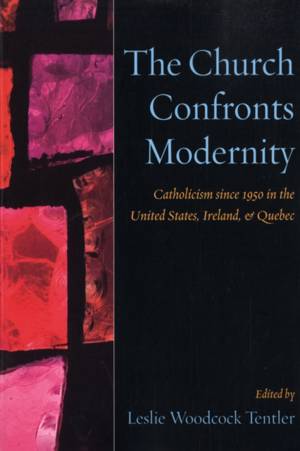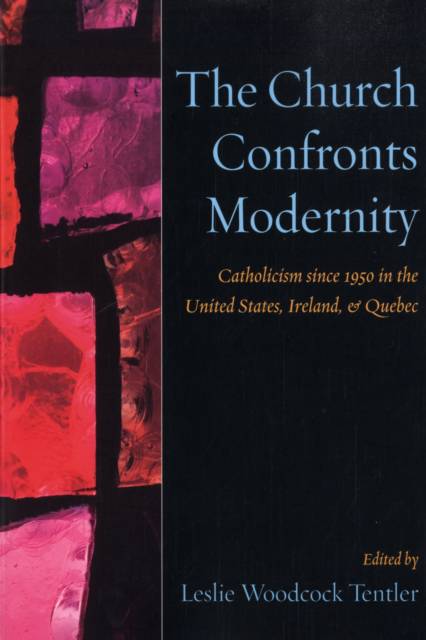
- Retrait gratuit dans votre magasin Club
- 7.000.000 titres dans notre catalogue
- Payer en toute sécurité
- Toujours un magasin près de chez vous
- Retrait gratuit dans votre magasin Club
- 7.000.000 titres dans notre catalogue
- Payer en toute sécurité
- Toujours un magasin près de chez vous
The Church Confronts Modernity
Catholicism Since 1950 in the United States, Ireland, and Quebec
Leslie Woodcock TentlerDescription
The Church Confronts Modernity assesses the history of Roman Catholicism since 1950 in the United States, the Republic of Ireland, and the Canadian province of Quebec. All three locales in 1950, despite very real differences in terms of economics, politics, and demography, were characterized by an institutionally vibrant Catholicism. Attendance at Mass was remarkably high, as was the frequency with which the laity received the sacraments. Devotional activities, especially those centered on the Virgin Mary, attracted a wide range of participants. Vocations to the priesthood and religious life were sustained at healthy levels. Large numbers of children attended Catholic schools, while their parents gave at least verbal assent to Church teaching on contraception and the indissolubility of marriage.
Over the course of recent decades, these three locales have grown more alike: less rural, more affluent, increasingly wedded to an ideology of pluralism. The institutional health of Catholicism in each jurisdiction has also eroded. The book's essays seek to explore this seeming decline and assess both its causes and its significance.
The authors discuss trends in Mass attendance and devotions; reception of the sacraments; vocations to the priesthood and religious life; attendance at Catholic schools and colleges; and support for church teaching in the social, political, and sexual realms. By comparing these "trajectories of decline," readers will better understand the forces that have contributed to the change in Catholicism in the Western nations. The authors are especially interested in the relative impact of the Second Vatican Council.
The book includes two essays each on Quebec, the United States, and the Republic of Ireland and two concluding essays that take a comparative look at developments in all three locales. The contributors are R. Scott Appleby, Gregory Baum, Kevin Christiano, James D. Davidson, Michele Dillon, Michael Gauvreau, Dermot Keogh, and Lawrence Taylor.
ABOUT THE AUTHOR:
Leslie Woodcock Tentler, professor of history at the Catholic University of America, writes mainly on American religious history, particularly U.S. Catholicism.
PRAISE FOR THE BOOK:
"A rich survey of the changes that affected the Catholic Church in three locales where it once flourished." - Association of Theological Booksellers
"The noted collaboration of the authors and the subsequent editing of their individual essays after the conference makes this collection of essays a solid unified work." -- Catholic Books Review Online
"Recommended" -- E. Thompson, Choice
"The church confronting modernity in the United States, Ireland, and Quebec was a conference sponsored by the Catholic University of America. Leslie Woodcock Tentler (Department of History, Catholic University of America) organized the conference and edited the proceedings into an idea-packed volume. Comparing the evolution and devolution of the three churches in the United States, Ireland, and Quebec turns out to be a most interesting read and an intellectually stimulating volume. . . . Gregory Baum provides a comprehensive overview of the complex relationship of Quebec, Ireland, and American Catholicism. . . . He writes with great insight and wide academic experience, and his essay is worth the price of the book. Students will benefit greatly from the different types of scholarly analyses displayed in this volume" -- Terence J. Fay, S.J., American Catholic Studies
"In her collective volume, The Church Confronts Modernity, Professor Leslie Woodcock Tentler has produced an insightful, well-organized, and balanced comparative-religious study looking at Catholicism in the post-World War era in three different environments: the province of Quebec, Ireland, and the United States. . . . Tentler has produced a valuable text that not only de
Spécifications
Parties prenantes
- Auteur(s) :
- Editeur:
Contenu
- Nombre de pages :
- 302
- Langue:
- Anglais
Caractéristiques
- EAN:
- 9780813214948
- Date de parution :
- 10-10-07
- Format:
- Livre broché
- Format numérique:
- Trade paperback (VS)
- Dimensions :
- 153 mm x 228 mm
- Poids :
- 503 g







